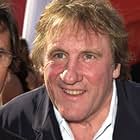The life & work of polish filmmaker Andrzej Wajda.The life & work of polish filmmaker Andrzej Wajda.The life & work of polish filmmaker Andrzej Wajda.
Sean Connery
- Self
- (archive footage)
Zbigniew Cybulski
- Self
- (archive footage)
Gérard Depardieu
- Self
- (archive footage)
Krystyna Janda
- Self
- (archive footage)
Hervé Jolly
- Speaker
- (voice)
Jochen Nix
- Speaker
- (voice)
Jerzy Radziwilowicz
- Self
- (archive footage)
Storyline
Did you know
- Quotes
Andrzej Wajda: What were our inspirations? Italian neorealism. It was close to us, because it showed poor people like us.
Featured review
This documentary is almost entirely composed of Andrzej Wajda sitting at a desk and commenting on selected movies from his career - how they were made, his battles with the censors, what key scenes meant to the Polish viewing public, etc. We see selected clips from each film but it's by no means a complete description of them or their context, so some background in Polish history is helpful. It makes for an excellent jumping off point if you want to explore Wajda's films though, and there is something very touching about seeing the director speaking so eloquently about six decades of his work in the final year of his life - he died at age 90 a couple of months before this was released.
Wajda was a director who was integrally tied with the national identity of Poland, with his films depicting some of the horrifying events of WW2, the country trying to westernize under the watchful eye of the Soviets, the solidarity movement, and even its national poem (Pan Tadeusz). The 12 films covered in 95 minutes are:
A Generation (1954) Kanal (1956) Ashes and Diamonds (1958) Innocent Sorcerers (1960) The Promised Land (1975) Man of Marble (1977) Young Girls of Wilko (1979) Man of Iron (1981) Danton (1983) Pan Tadeusz (1999) Katyn (2007) Walesa: Man of Hope (2013)
Perhaps the most stirring moments are when Wajda speaks about his father, who was among the officers massacred by the Soviets at Katyn, and his mother, who was told by authorities all the way to her death in 1950 that he was simply missing, and may return any time. Wajda himself fought in the resistance and saw so much over his life that it was humbling to watch. If only there was other such documentaries where directors speak from the heart and methodically go through their filmography.
Wajda was a director who was integrally tied with the national identity of Poland, with his films depicting some of the horrifying events of WW2, the country trying to westernize under the watchful eye of the Soviets, the solidarity movement, and even its national poem (Pan Tadeusz). The 12 films covered in 95 minutes are:
A Generation (1954) Kanal (1956) Ashes and Diamonds (1958) Innocent Sorcerers (1960) The Promised Land (1975) Man of Marble (1977) Young Girls of Wilko (1979) Man of Iron (1981) Danton (1983) Pan Tadeusz (1999) Katyn (2007) Walesa: Man of Hope (2013)
Perhaps the most stirring moments are when Wajda speaks about his father, who was among the officers massacred by the Soviets at Katyn, and his mother, who was told by authorities all the way to her death in 1950 that he was simply missing, and may return any time. Wajda himself fought in the resistance and saw so much over his life that it was humbling to watch. If only there was other such documentaries where directors speak from the heart and methodically go through their filmography.
- gbill-74877
- May 19, 2020
- Permalink
Details
Contribute to this page
Suggest an edit or add missing content








